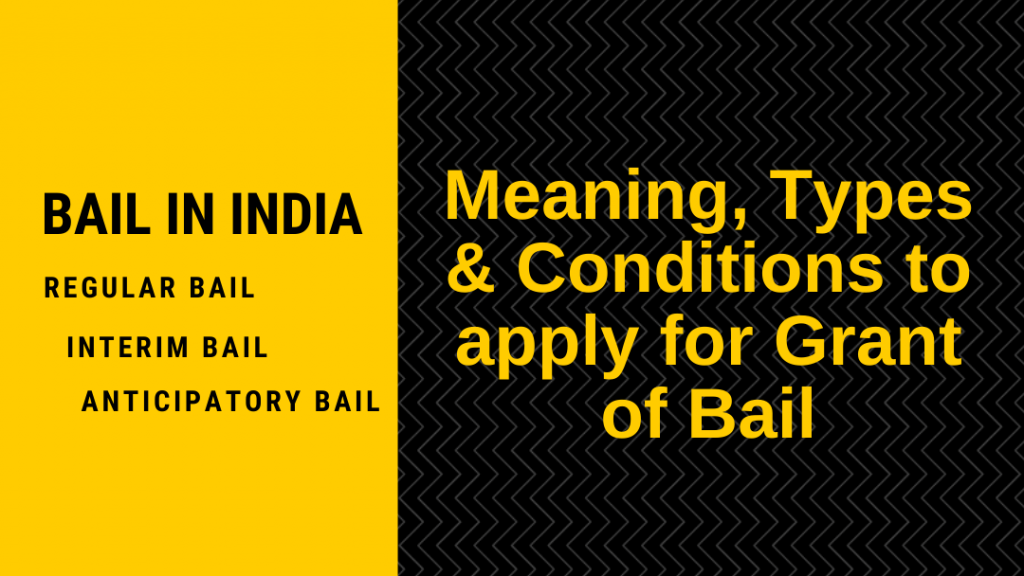
What exactly is bail?
The word “bail” comes from the old French word “bailer,” which means “to give” or “to hand over.” Bail is the temporary release of a person who has been charged with a crime before the court has made a decision. Bail is the security that is put up so that the accused person can be let out of jail.
India’s various types of bail

There are usually three types of bail in India, each of which is based on the nature of the crime:
Regular bail: A person who has been arrested or is in police custody is usually given regular bail. Under sections 437 and 439 of the CrPC, a bail application can be made for regular bail.
Interim bail is a type of bail that is given for a short amount of time before the hearing for regular bail or anticipatory bail.
Section 438 of the CrPC says that either the session court or the High Court can give anticipatory bail. A person who thinks the police might arrest them for a crime for which they can’t get bail can ask the court for “anticipatory bail.”
Conditions for granting bail for crimes that can be bailed out
Section 436 of the Code of Criminal Procedure of 1973 says that a person who is accused of an IPC crime that can be released on bail can get it.
In order to get bail for a bailable crime, there must be enough evidence that the accused person did not commit the crime.
There are enough reasons to look into this matter further.
The person is not being charged with a crime that could lead to death, life in prison, or up to 10 years in prison.
Conditions for granting bail for crimes that can’t be bailed out
Section 437 of the Code of Criminal Procedure of 1973 says that the accused can’t ask for bail for crimes that can’t be bailed out. In cases where bail cannot be granted, it is up to the court to decide whether bail should be granted.
In a non-bailable crime, bail can be given if the accused is a woman, or a child, or if the crime was committed by a person under the age of 18.
If there is insufficient evidence, bail can be granted for crimes that cannot be bailed.
If the complainant waits too long to file an FIR, bail may be given.
If the person being accused is very sick.
Also, Read CIVIL PROCEDURE CODE AND LIMITATION ACT NOTES
Bail is revoked
The bail can be taken away at any time by the court. The CrPC gives the court this power in sections 437(5) and 439(2). The court can take back the bail it set and tell the police officer to arrest and keep the person in custody. What is the bond?
The word “bail” comes from the old French word “bailer,” which means “to give” or “to hand over.” Bail is the temporary release of a person who has been charged with a crime before the court has made a decision. Bail is the security that is put up so that the accused person can be let out of jail.
India’s various types of bail
There are usually three types of bail in India, each of which is based on the nature of the crime:
Regular bail: A person who has been arrested or is in police custody is usually given regular bail. Under sections 437 and 439 of the CrPC, a bail application can be made for regular bail.
Interim bail is a type of bail that is given for a short amount of time before the hearing for regular bail or anticipatory bail.
Section 438 of the CrPC says that either the session court or the High Court can grant anticipatory bail. A person who thinks the police might arrest them for a crime for which they can’t get bail can ask the court for “anticipatory bail.”
Conditions for granting bail for crimes that can be bailed out
Section 436 of the Code of Criminal Procedure of 1973 says that a person who is accused of an IPC crime that can be released on bail can get it.
In order to get bail for a bailable crime, there must be enough evidence that the accused person did not commit the crime.
There are enough reasons to look into this matter further.
The person is not being charged with a crime that could lead to death, life in prison, or up to 10 years in prison.
Conditions for granting bail for crimes that can’t be bailed out
Section 437 of the Code of Criminal Procedure of 1973 says that the accused can’t ask for bail for crimes that can’t be bailed out. In cases of crimes that can’t be bailed out, it’s up to the court to decide if the bail should be given.
In a non-bailable crime, bail can be given if the accused is a woman, a child, or if the crime was committed by a person under the age of 18.
If there is insufficient evidence, bail can be granted for crimes that cannot be bailed.
If the complainant waits too long to file an FIR, bail may be given.
if the person being accused is very sick.
cancellation of bail The court has the power to take away the bail at any time. The CrPC gives the court this power in sections 437(5) and 439(2). The court can take back the bail it set and tell the police officer to arrest and keep the person in custody.

